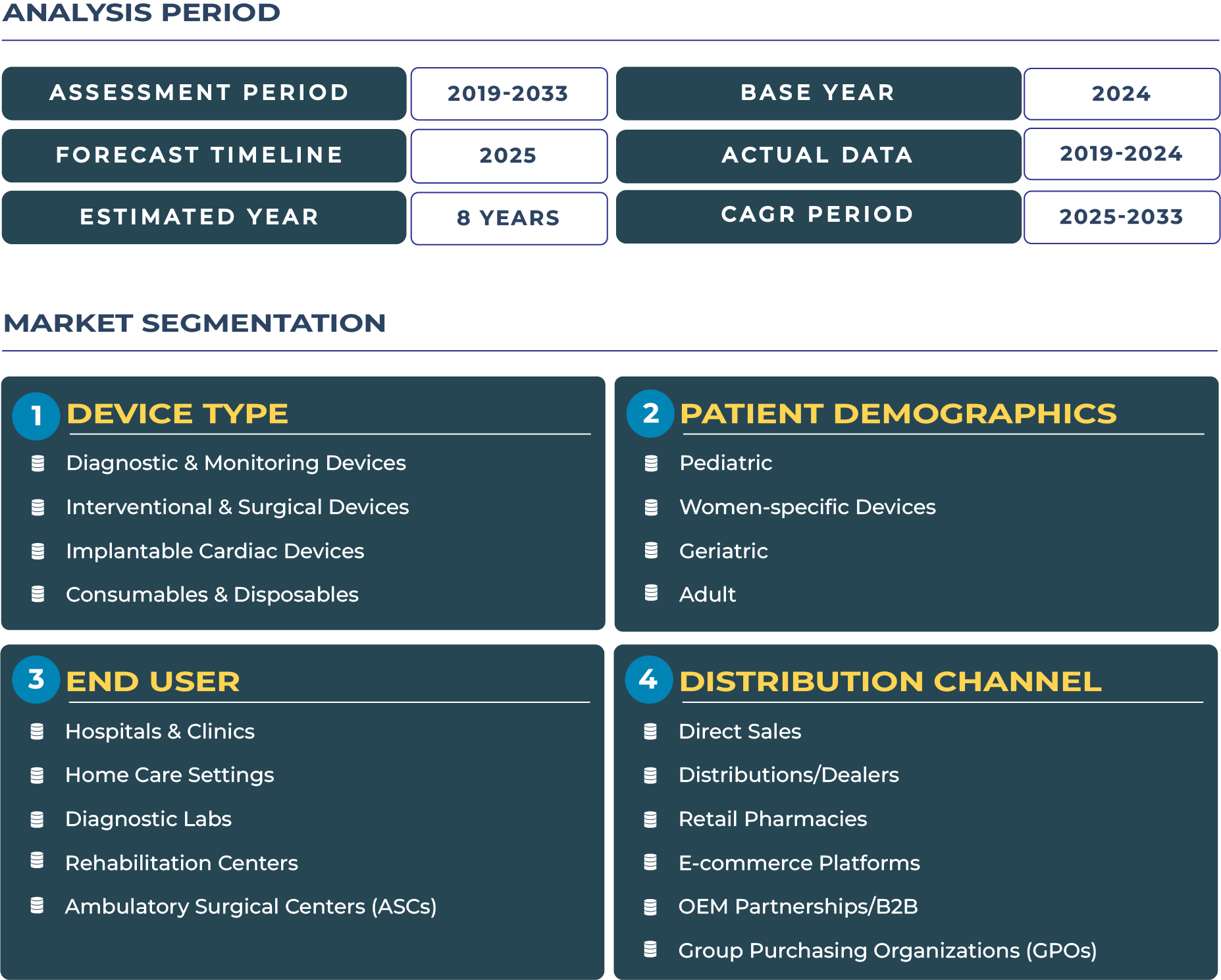Hong Kong Cardiovascular Devices Market: Gateway Hub with Tertiary Care Excellence
The Hong Kong Cardiovascular Devices Market is forecast to expand from USD 568.9 million in 2025 to USD 1,430.7 million by 2033, at a CAGR of 12.2%. Growth is propelled by strong tertiary hospital adoption, a high level of healthcare spending, and steady demand from cross-border patients seeking specialized cardiovascular care. While small market scale and heavy dependence on imported devices create cost pressures, Hong Kong’s established healthcare system, high per-capita income, and role as a regional medical hub ensure continued investment in cardiovascular monitoring, surgical, and implantable technologies. The city is well-positioned to serve both local patients and international medical tourists seeking advanced cardiac treatment solutions.
How Hong Kong’s Tertiary Hospitals and Cross-Border Care Are Driving Demand for Cardiovascular Devices
Hong Kong has emerged as a gateway cardiovascular devices market where world-class tertiary hospitals and cross-border patient flows are creating strong demand for advanced medical technologies. Its position as a financial and healthcare hub in Asia, coupled with a highly international patient base, gives the city a unique advantage in the cardiovascular devices industry. Tertiary hospitals such as the Hospital Authority network and private institutions have been early adopters of high-end implantable cardiac devices, interventional solutions, and precision monitoring systems. With rising cases of cardiovascular disease linked to aging demographics and lifestyle factors, the demand for advanced interventions such as minimally invasive surgery and remote monitoring devices is accelerating.
Drivers & Restraints: Key Growth Catalysts and Barriers Shaping Hong Kong’s Cardiovascular Devices Industry
Strength of Tertiary Hospitals and Cross-Border Demand Driving Market Momentum
Hong Kong’s healthcare system is anchored by strong tertiary hospitals that prioritize adoption of cutting-edge cardiovascular technologies. Institutions such as Hospital Authority hospitals continue to expand specialized cardiac centers, integrating innovations such as next-generation implantable defibrillators and interventional surgical equipment. The city also benefits from cross-border patients from Mainland China, where demand for advanced cardiovascular procedures is rising but often constrained by limited access to premium healthcare. This flow of patients sustains a robust demand pipeline for advanced devices and premium consumables, positioning Hong Kong as a high-touch cardiovascular hub in the region.
Cost Sensitivity, Import Dependence, and Small Scale Hindering Growth
Despite its strengths, the Hong Kong cardiovascular devices sector faces structural constraints. The city’s small population restricts scale, limiting opportunities for volume-based expansion. Additionally, Hong Kong relies heavily on imported cardiovascular devices, which increases procurement costs and exposes hospitals to global supply chain volatility. Price sensitivity among mid-tier private providers also constrains the adoption of premium technologies, especially in consumables and disposables. High costs of operations, compounded by geopolitical uncertainties and post-pandemic healthcare spending adjustments, further underline the importance of tailored pricing strategies and diversified sourcing for cardiovascular device providers operating in Hong Kong.
Trends & Opportunities: Emerging Patterns Redefining the Cardiovascular Devices Ecosystem in Hong Kong
Specialist Cardiac Centers and Urban Monitoring Adoption Setting New Standards
Hong Kong is witnessing significant growth in specialist cardiac centers within both public and private hospitals. These centers are early adopters of advanced interventional and surgical devices, including robotic-assisted systems for cardiovascular surgery. Meanwhile, urban adoption of remote cardiac monitoring solutions has increased, driven by growing use of wearable monitoring devices and digital health integration. These trends demonstrate how Hong Kong’s advanced urban healthcare environment supports rapid adoption of diagnostic and monitoring technologies that improve both inpatient and outpatient cardiac care.
Opportunities in Medical Tourism, Premium Devices, and Cross-Border Partnerships
Cardiovascular device companies have clear opportunities to position Hong Kong as a medical tourism hub, targeting international patients seeking premium cardiac care. There is strong potential for premium device placement, particularly for implantable cardiac devices and minimally invasive surgical technologies. Cross-border partnerships with hospitals and healthcare providers in the Greater Bay Area of Mainland China are another promising growth pathway. Such collaborations allow companies to leverage Hong Kong’s advanced healthcare infrastructure while accessing larger patient volumes across the border, making the city a strategic bridge for expanding cardiovascular device adoption in Asia.
Competitive Landscape: Strategies and Developments Defining Hong Kong’s Cardiovascular Devices Sector
The competitive landscape of Hong Kong cardiovascular devices market is characterized by strong participation from multinational players such as Medtronic, Abbott, and Boston Scientific, alongside a robust private hospital sector. Companies are focusing on strategies tailored to Hong Kong’s tertiary care environment, including premium service delivery and cross-border referral networks. Recent developments include tertiary hospital upgrades (2024), expansion of specialist cardiac centers, and adoption of telemonitoring in private hospitals to improve long-term patient management. Companies that align with Hong Kong’s premium healthcare positioning, offer advanced interventional and implantable technologies, and engage in cross-border partnerships are best placed to capture market share in this competitive environment.







